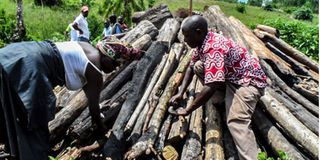Kalangala issues new rules on charcoal burning

Residents prepare a kiln at Namatembe Forest Reserve on Bugala Island in Kalangala District last month. PHOTO BY EDSON NDYANSIIMA
Kalangala- Authorities in Kalangala District have issued new guidelines to regulate commercial charcoal production in the area.
Under the new arrangement, charcoal dealers are required to get licences for production and transportation of charcoal. A licence costs Shs36,000 and will be renewable every month.
The guidelines also stipulate that a team from the district department of natural resources has to first inspect kilns where charcoal burning is to take place and sanction trees to be harvested.
Mr Willy Lugoloobi, the district chairperson, said the move is aimed at saving the remaining natural forest cover.
“If we don’t check the ongoing indiscriminate cutting of trees for charcoal burning now, we shall end up getting desertification and landslides which may even kill the aquatic life within Lake Victoria,” he said.
Mr Lugoloobi said a truck carrying 30 sacks of charcoal, which was illegally being ferried out of the district, has already been impounded.
Mr Maurice Bafirawala, the district environment officer, said charcoal burners are free to do their work in privately owned forests as long as they have a licence.
“But a forestry officer has to first monitor the logs they are planning to use for charcoal burning. On the other hand, central forest reserves are no go areas for charcoal burners,” he said.
Mr Bafirawala said the district has strengthened its law enforcement through mounting roadblocks in all the islands to arrest traders illegally transporting charcoal to the mainland.
“We advise our people to embrace alternative sources of energy so that endangered indigenous tree species such as mvule and mahogany are preserved,” he said.
Last month, five charcoal dealers, who attempted to smuggle more than 600 sacks of charcoal out of the district on a boat drowned after it capsized. The charcoal was reportedly destined for Kenya.
Mr Bafirawala said the district has also issued stringent guidelines to farmers planning to grow rice in the area in order to conserve wetlands.
“As a district, we have banned growing of rice within the 200 and 100 metres buffer zone for the lake and wetlands respectively. Routine growing of rice on the same piece of land and on hill tops within underlying Islands is also outlawed,” he said.
The environment official also said at least half of residents who lost their fishing gear and boats as a result of the ongoing crackdown on illegal fishing, had engaged in rice growing and charcoal burning.
“Following operations against illegal fishing, many people resorted to destroying wetlands for rice growing and cutting down trees which is equally disastrous,” Mr Bafirawala said.




